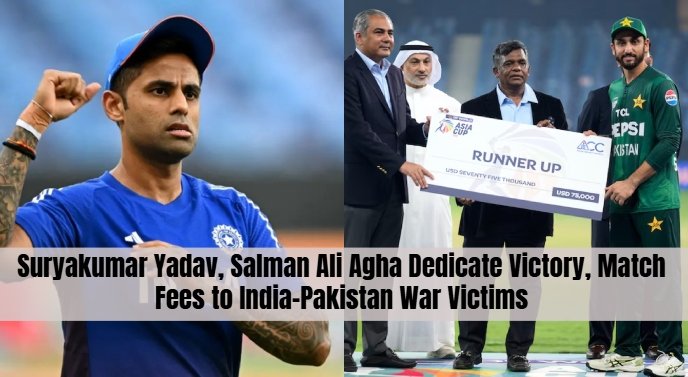The Asia Cup 2025 was not just remembered for India’s dominant unbeaten run and their record ninth title, but also for how politics overshadowed cricket throughout the tournament. From handshake controversies to trophy boycotts, the competition carried more off-field noise than ever before. Adding to that list of dramas was the issue of match fee donations, where both captains made public pledges that carried deep political undertones.
Captains Suryakumar Yadav and Salman Ali Agha Dedicate Match Fees to War Victims
India’s stand-in captain Suryakumar Yadav, who also played a decisive role in his team’s journey, used the platform to make a strong nationalistic statement. After the final win over Pakistan, he posted on X: “I have decided to donate my match fees from this tournament to support our Armed Forces and the families of the victims who suffered from the Pahalgam terror attack. You always remain in my thoughts.” The post quickly went viral, drawing praise from Indian fans but also criticism for mixing a sporting achievement with ongoing political tensions.
In the post-match presentation of the Super four match, where India beat Pakistan comfortably, Suryakumar earloer dedicated the victory to the war victims of Pahalgam. The ICC fined him 30 percent of his match fee for politicizing the press conference, but the sentiment had already stirred strong reactions across social and mainstream media. His stance was clear: cricket was being used as a platform for national solidarity, even if it meant breaching the spirit of sportsmanship.
On the other side, Pakistan’s captain Salman Ali Agha took a very different tone when asked about his team’s gesture. He was firm in his disapproval of how cricket had been dragged into the war narrative. In the press conference, he said:
“Sir, even if I were not the captain of Pakistan right now and just a cricket fan, I would not support this thing, Sir, because it’s wrong. If a child is watching at home, in Pakistan or India, what message are we giving them, Sir? We are not giving a good message because people consider us role models. If we as role models start doing things like this, then we are not inspiring anyone. And if we are inspiring, it is on the wrong thing. So, I still say, Sir, that I think whatever happened was wrong and shouldn’t have happened. Now, those who did it, those questions should naturally be addressed to them. You are asking me, but I will never say that this is a good thing, Sir.”
Salman then announced that the entire Pakistani squad would donate their Asia Cup match fees to the civilians and children affected by the recent Indian attack inside Pakistan. His statement resonated with his country’s supporters who praised his empathetic approach, contrasting it sharply with India’s more militaristic framing.
“And as a team, we are donating our entire match fees. We are donating it to the civilians and children who were affected by the recent Indian attack.”
This back-and-forth of donations further cemented how much Asia Cup 2025 was pulled into political battles. What should have been remembered for Tilak Varma’s match-winning knock, Kuldeep Yadav’s brilliant bowling, or Abhishek Sharma’s explosive batting was instead overshadowed by dedications, statements, and symbolic gestures from both sides. While India celebrated their ninth title, the world was left questioning whether cricket was still just a game or simply another platform for political messaging.
Also, see:
Asia Cup 2025: A Cricket Tournament or a Political Battlefield?

